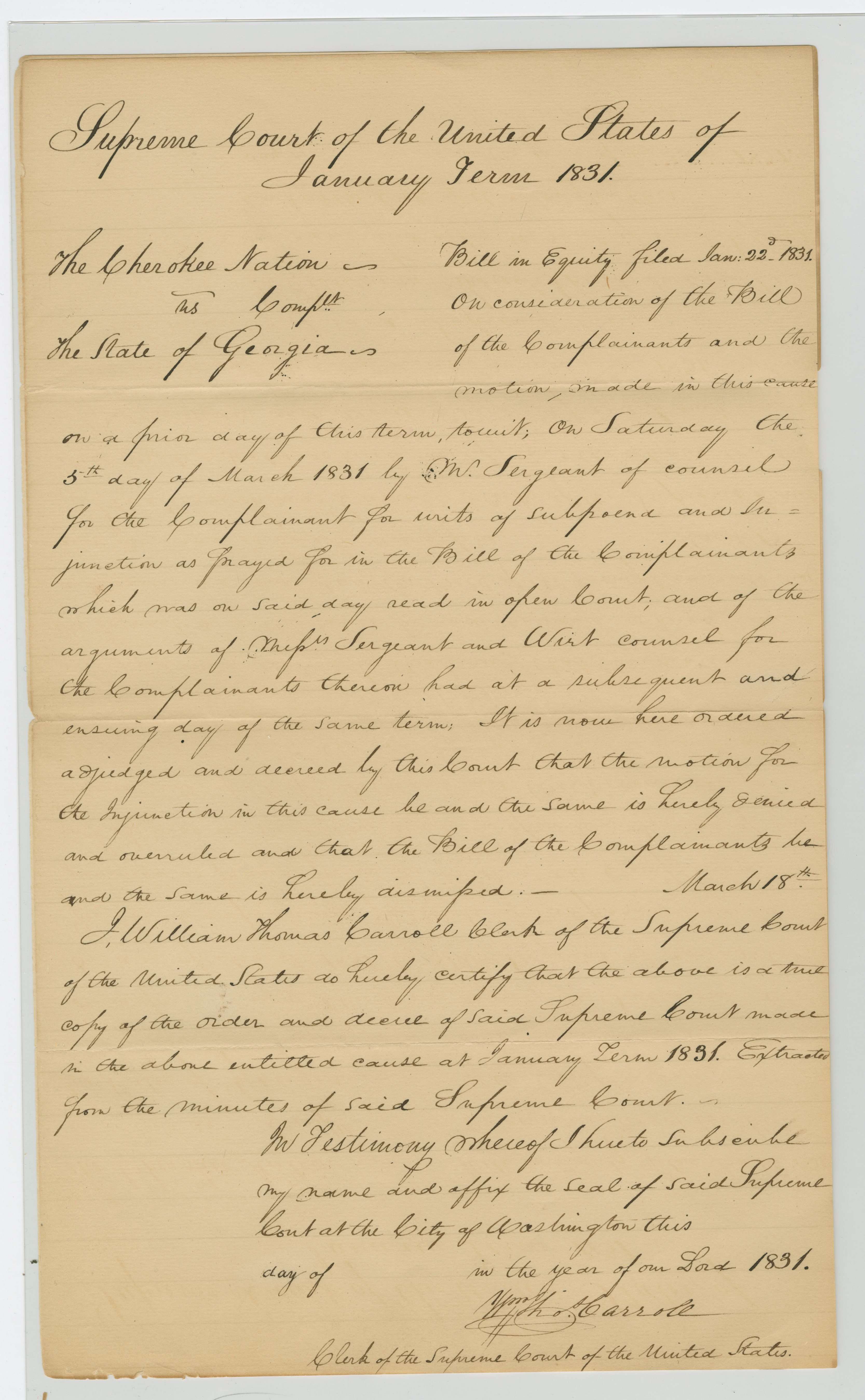Judgement in Cherokee Nation v. Georgia
3/18/1831
Add to Favorites:
Add all page(s) of this document to activity:

In 1828, the state of Georgia passed a series of acts taking away rights of Cherokees residing within the state, including Cherokee removal from land that the state wanted. The Cherokee asserted that Georgia did not have the jurisdiction or authority to do these things, since the Cherokee Nation was sovereign and protected under a treaty with the United States.
The Cherokee first tried to negotiate a resolution with President Andrew Jackson; but the negotiations fell apart quickly.
Under the leadership of principal chief John Ross, the Cherokee Nation sought an injunction — or order to stop what the State of Georgia was doing — from the U.S. Supreme Court.
This is the judgment denying the Cherokee Nation an injunction against Georgia laws, and dismissing their bill of complaints. The Supreme Court said they lacked jurisdiction to hear the case, and that an “Indian Nation” is not a “Foreign Nation” for jurisdiction under the Constitution, but instead a “domestic dependent nation.”
The case was dismissed, leaving the Cherokee at the mercy of the laws of the state of Georgia. The issue of "tribal sovereignty" would come up again in Worcester v. Georgia in 1832.
This document was digitized by teachers in our Primarily Teaching 2016 summer workshop in Washington, D.C.
The Cherokee first tried to negotiate a resolution with President Andrew Jackson; but the negotiations fell apart quickly.
Under the leadership of principal chief John Ross, the Cherokee Nation sought an injunction — or order to stop what the State of Georgia was doing — from the U.S. Supreme Court.
This is the judgment denying the Cherokee Nation an injunction against Georgia laws, and dismissing their bill of complaints. The Supreme Court said they lacked jurisdiction to hear the case, and that an “Indian Nation” is not a “Foreign Nation” for jurisdiction under the Constitution, but instead a “domestic dependent nation.”
The case was dismissed, leaving the Cherokee at the mercy of the laws of the state of Georgia. The issue of "tribal sovereignty" would come up again in Worcester v. Georgia in 1832.
This document was digitized by teachers in our Primarily Teaching 2016 summer workshop in Washington, D.C.
Transcript
Supreme Court of the United States of January Term 1831.The Cherokee Nation
~ vs ~ [illegible]
The State of Georgia
Bill in Equity filed Jan: 22nd 1831. On consideration of the Bill of the complainants and the motion made in this court on a prior day of this term, towit; On Saturday the 5th day of March 1831 by M. Sergeant of counsel for the Complainant for writs of subpoena and injunction as payed for in the Bill of the Complainants which was on said day read in open Court; and of the arguments of Mis. Sergeant and Writ counsel for the complainants thereon had a subsequent and ensuing day of the same term; It is now here ordered adjudged and decreed by the this Court that the motion for the Injunction in this cause be and the same is hereby denied and overruled and that the Bill of the Complainants be and the same is hereby dismissed. -- March 18th.
- William Thomas Carroll clerk of the Supreme Court of the United States do hereby certify that the above is a true copy of the order and decree of said Supreme Court made in the above entitled cause at January Term 1831. Extracted from the minutes of said Supreme Court.
William Thomas Carrol [Signature]
Clerk of the Supreme Court of the United States.
This primary source comes from the Records of the Supreme Court of the United States.
National Archives Identifier: 38995559
Full Citation: Judgment in the Case of the Cherokee Nation v. the State of Georgia; 3/18/1831; Cherokee Nation v. Georgia; Original Jurisdiction Case Files, 1792 - 1998; Records of the Supreme Court of the United States, Record Group 267; National Archives Building, Washington, DC. [Online Version, https://www.docsteach.org/documents/document/judgement-cherokee-nation-v-georgia, April 25, 2024]Activities that use this document
- American Indian Voting Rights through History
Created by the National Archives Education Team
Rights: Public Domain, Free of Known Copyright Restrictions. Learn more on our privacy and legal page.



